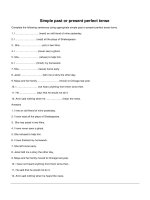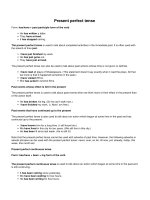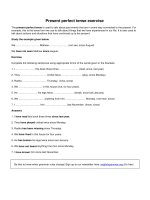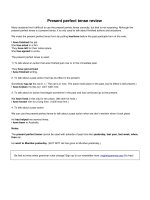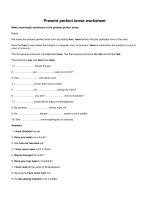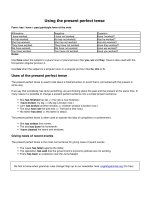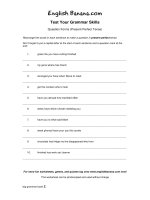Present perfect tense
Bạn đang xem bản rút gọn của tài liệu. Xem và tải ngay bản đầy đủ của tài liệu tại đây (14.9 KB, 2 trang )
Present perfect tense
Form:
has/have + past participle form of the verb
He
has written
a letter.
They
have arrived.
It
has stopped
raining.
The present perfect tense
is used to talk about completed activities in the immediate past. It is often used with
the adverb of time
just.
I
have just finished
my work.
He
has just gone
out.
They
have just arrived.
The present perfect tense can also be used to talk about past actions whose time is not given or definite.
I
have read
all plays of Shakespeare. (This statement doesn’t say exactly when I read the plays. All that
we know is that it happened sometime in the past.)
I
have visited
Africa.
She
has acted i
n several films.
Past events whose effect is felt in the present
The present perfect tense is used to talk about past events when we think more of their effect in the present than
of the action itself.
He
has broken
his leg. (So he can’t walk now.)
I
have finished
my work. (= Now I am free.)
Past events that have continued up to the present
The present perfect tense is also used to talk about an action which began at some time in the past and has
continued up to the present.
I
have known
him for a long time. (I still know him.)
We
have lived
in this city for ten years. (We still live in this city.)
He
has been
ill since last week. (He is still ill.)
Note that the present perfect tense cannot be used with adverbs of past time. However, the following adverbs or
adverb phrases can be used with the present perfect tense: never, ever, so far, till now, yet, already, today, this
week, this month etc.
Present perfect continuous tense
Form: has/have + been + ing form of the verb
The present perfect continuous tense
is used to talk about an action which began at some time in the past and
is still continuing.
It
has been raining
since yesterday.
We
have been waiting
for two hours.
He
has been writing
for five hours.
Be first to know when grammar rules change! Sign up to our newsletter here: englishgrammar.org (It's free)
Powered by TCPDF (www.tcpdf.org)
